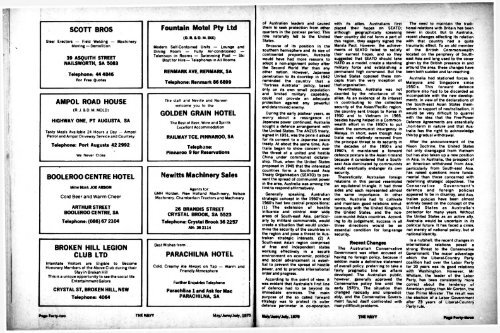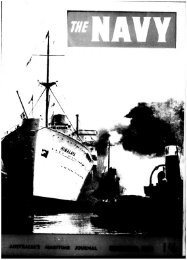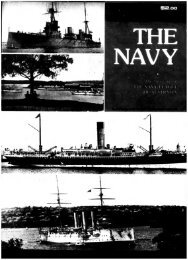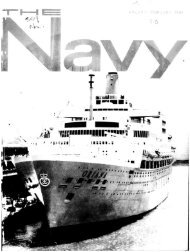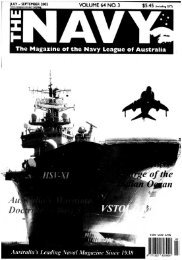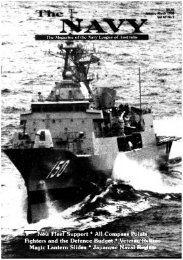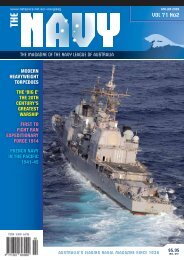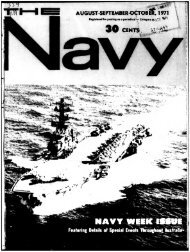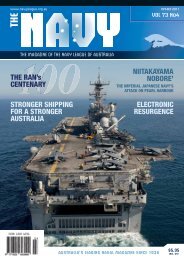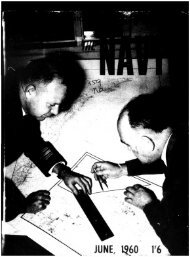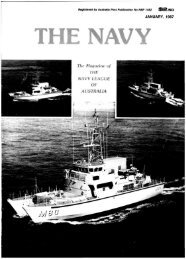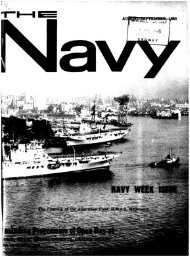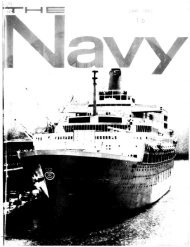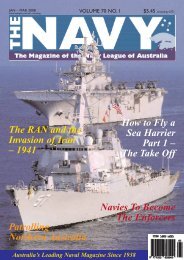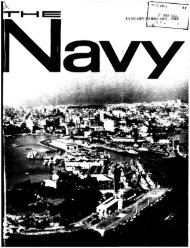The Navy Vol_37_Part1 (Feb-Mar-Apr, May-June-July 1975)
The Navy Vol_37_Part1 (Feb-Mar-Apr, May-June-July 1975)
The Navy Vol_37_Part1 (Feb-Mar-Apr, May-June-July 1975)
- No tags were found...
You also want an ePaper? Increase the reach of your titles
YUMPU automatically turns print PDFs into web optimized ePapers that Google loves.
SCOTT BROSSteel Erectors — Field Welding — MachineryMoving — Demolition39 ASQUITH STREETNAILSWORTH, SA 5083Telephone: 44 4846For Free QuotesAMPOL ROAD HOUSE(R. J. & 0. M. MOLD)HIGHWAY ONE, PT AUGUSTA, SATasty Meals Available 24 Hours a Day — AmpolPetrol and Ampol Driveway Service and CourtesyTelephone: Port Augusta 42 2992We Never CloseBOOLEROO CENTRE HOTELMine Host: JOE ARSONCold Beer and Warm CheerARTHUR STREETBOOLEROO CENTRE, SATelephone: (086) 67 2104BROKEN HILL LEGIONCLUB LTDInterstate Visitors are Eligible to BecomeHonorary Members of the Above Club during theirStay in Broken HillThis is a unique opportunity to see the social lifeEntertainment GaloreCRYSTAL ST, BROKEN HILL, NSWTelephone: 4064Fountain Motel Pty Ltd(D. R. & 0. M. DM)Modern Self-Contained Units — Lounge andDining Room — Fully Air-conditioned —Television in Rooms — Swimming Pool — SkiBoat for Hire — Telephones in All RoomsRENMARK AVE, RENMARK, SATelephone: Renmark 86 6899<strong>The</strong> staff and Neville and Noreenwelcome you to theGOLDEN GRAIN HOTEL<strong>The</strong> Best of Beer. Wine and SpiritsExcellent AccommodationRAILWAY TCE, PINNAROO, SATelephone:Pinnaroo 9 for ReservationsNewitts Machinery SalesAgents tor:GMH Holden. New Holland Machinery. NelsonMachinery. Chamberlain Tractors and Machinery26 BRANDIS STREETCRYSTAL BROOK, SA 5523Telephone: Crystal Brook 36 2257Best Wishes from ...AH: 362114PARACHILNA HOTELCold. Creamy Ale Always on Tap — Warm andFriendly AtmosphereFurther Enquiries TelephoneParachiliia 1 and Ask for MacPARACHILNA. SAof Australian leaders and causedthem to seek protection from otherquarters in the postwar period. Thisrole naturally fell to the UnitedStates.Because of its position in thesouthern hemisphere and its size ofcontinental proportion. Australiawould have had more reasons toadopt a non-alignment policy afterthe Second World War than anyother nation. However. Japanesepenetration to its doorstep in 1942reminded the country that a"fortress Australia" policy, basedonly on its own small populationand limited military capability,could not provide an adequateprotection against any powerfuland determined enemy.During the early postwar years, asworry about a resurgence ofJapanese power continued. Australiasought a defence arrangement withthe United States. <strong>The</strong> ANZUS treaty,signed in 1951. was the price it askedfor its consent to a Japanese peacetreaty. At about the same time. Australiabegan to show concern overthe threat of a united and hostileChina under communist dictatorship.Thus, when the United Statesproposed in 1945 that the interestedcountries form a South-east AsiaTreaty Organisation (SEATO) to preventthe spread of communist powerin the area. Australia was among thefirst to respond affirmatively.Generally speaking. Australianstrategic concept in the 1950's and1960's had two central propositions:(1) <strong>The</strong> extension of hostileinfluence and control over wideareas of South-east Asia, particularlyby militant communists, wouldcreate a situation that would underminethe security of the countries inthe region and pose a threat to Australianstrategic interests. (2) ASouth-east Asian region comprisedof free and independent statesworking effectively in a secureenvironment on economic, politicaland social advancement is essentialto prevent the spread of hostilepower, and to promote internationalorder and progress.According to this point of view, itwas evident that Australia's first lineof defence had to be beyond itsimmediate environs. <strong>The</strong> mainpurpose of the so called forwardstrategy was to protect its outerdefence perimeter in corporationwith its allies. Australians firstplaced their hopes on SEATO:although geographically speakingtheir country did not form a part ofthis region, they eagerly signed theManila Pact. However, the achievementsof SEATO tailed to satisfytheir earnest hopes, and so theysuggested that SEATO should takeNATO as a model, create a standingmilitary force and establishing apermanent high command. But theUnited States opposed these conceptsfrom the very inception ofthat organisation.Nevertheless, Australia was notdaunted by the reluctance of itsallies. As an evidence of its interestin contributing to the collectivesecurity of the Asian/Pacific region,the country sent troops to Korea in1950 and to Vietnam in 1965,besides having helped in a Commonwealtheffort in the 1950's to putdown the communist insurgency inMalaya In short, even though Australiawas relatively removed fromthe principal threat to its security inthe decades of the 1950s and1960's. it maintained a forwarddefence posture in the Asian rimlandbecause it considered that a SoutheastAsia dominated by communistswould eventually endanger its ownsecurity.<strong>The</strong>oretically, Australian foreignrelations in this period resembledan equilateral triangle. It had threesides and each represented almostthe same importance. In otherwords. Australia had to cultivateand maintain good relations simultaneouslywith the United Kingdom,the United States, and the noncommunistAsian countries. Accordingto its judgement, success in allthree directions would be anessential condition for long-rangesecurity.Recent Changes<strong>The</strong> Australian ConservativeGovernment was often accused ofhaving no foreign policy, because itseldom made a definitive statementof overall policy, preferring to take afairly pragmatic line as affairsdeveloped. <strong>The</strong> Australian public,however, generally approved theConservative policy line until theearty 1970 s <strong>The</strong> situation thenchanged radically and unpredictably.and the Conservative Governmentfound itself confronted withmany difficult problems.<strong>The</strong> need to maintain the traditionalrelations with Britain has beennever in doubt. But to Australia,recent changes affecting its relationwith that country had a quitetraumatic effect. To an old memberof the British Commonwealthlocated on the periphery of SoutheastAsia and long used to the covergiven by the British presence in andaround the area, these changes havebeen both sudden and far-reaching.Australia had stationed forces inMalaysia and Singapore since1950s. This forward defenceposture also had to be discarded asincompatible with the new developments.In view of the declarations ofthe South-east Asian States themselvesin support of neutralisation, itwould be very difficult to quarrelwith the idea that the Five-PowerDefence Agreements are essentially-hort-term in nature and that Australiahas the right to acknowledgethis by gradual withdrawal.After the announcement of theNixon Doctrine, the United Statesnot only disengaged from Vietnambut has also taken up a new positionin Asia. In Australia, the prospect ofan American withdrawal from Asia,particularly from South-east Asia,has raised questions more fundamentalthan those concerned withredefining strategic objectives. <strong>The</strong>Conservative Government'sdefence and foreign policiesappeared to be in disarray, and Australianpolicies have been almostentirely based on the concept of theUnited States as Australia'sprotector for many years. Withoutthe United States as an active ally.Australia would be uncertain in itspolitical future. It has faced a crisis,not merely of national policy, but ofnational identity.In a nutshell, the recent changes ininternational relations posed astrong threat to the ConservativeGovernment. <strong>The</strong> major advantagewhich the Liberal-Country Partycoalition had over the Labor Partyfor 20 years was Its good relationswith Washington. However, MrWhitlam. the leader of the LaborParty, has been consistently morecorrect about the tendency ofAmerican policy than Mr Gorton, tnethen Prime Minister. <strong>The</strong> result wasthe election of a Labor Governmentafter 23 years of Liberal-CountryParty rule.Aa^ f ••ill *ra|fl ronjf'lW THE NAVY <strong>May</strong>/<strong>June</strong>/Juty,•tot/JMN/My.lt7S THE NAVY Pace Forty-tine


